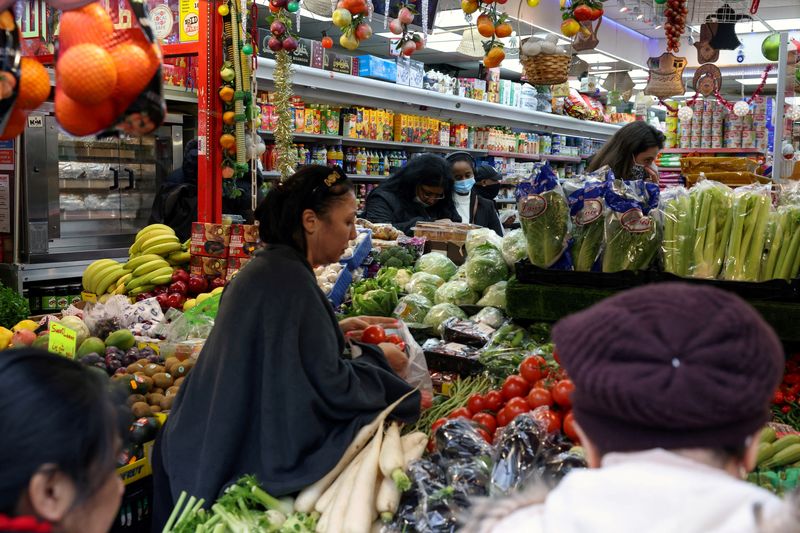By Andy Bruce and William Schomberg
LONDON (Reuters) -British inflation surged last month to its highest annual rate since 1982, pressuring finance minister Rishi Sunak to offer more help for households and the Bank of England to keep raising interest rates despite a risk of recession.
Consumer price inflation hit 9% in April, the Office for National Statistics said on Wednesday, surpassing the peaks of the early 1990s recession that many Britons remember for sky-high interest rates and widespread mortgage defaults.
Britain has the highest inflation of Europe's big economies and almost certainly in the Group of Seven, with Canada and Japan yet to report April data. Neither are likely to match Britain's price growth which also looks set to be longer-lasting.
Last month, the International Monetary Fund forecast Britain in 2023 faced slower economic growth and more persistent inflation than any other major economy.
Soaring energy bills were the biggest inflation driver, reflecting April's increase in regulated energy tariffs. Knock-on effects from Russia's invasion of Ukraine mean those bills are likely to jump again in October.
"We cannot protect people completely from these global challenges but are providing significant support where we can, and stand ready to take further action," Sunak said.
A Reuters poll of economists had pointed to a reading of 9.1%, up from 7.0% in March, and sterling fell.
Households face the biggest cost-of-living squeeze since records began in the 1950s, Britain's budget forecasters say, and consumer confidence has sunk towards all-time lows.
Anti-poverty campaigners urged Sunak to act now, starting with an immediate increase in welfare benefits.
"(Sunak's) inaction will make an already desperate situation for many even worse," Rebecca McDonald, senior economist at the Joseph Rowntree Foundation which campaigns for lower-income households, said.
A survey on Tuesday showed two in three people had kept their heating off when they would normally have turned it on, almost half were driving less or changing supermarkets and just over a quarter say they have skipped meals.
Food prices rose by nearly 7% in the 12 months to April, the ONS said.
On Monday, BoE Governor Andrew Bailey told lawmakers food price rises were a major worry as he apologised for "being apocalyptic for a moment".
While the government points to its 22 billion-pound ($27.4 billion) package of support for households so far, much of this is cancelled out by recent tax increases on workers.
The Times newspaper said Sunak was drawing up plans to cut taxes and increase home heating benefits by hundreds of pounds.
An increase in prices charged by restaurants and cafes, as value-added tax rates went back to their pre-pandemic levels in April, added to the inflation jump last month.
WORSE TO COME
The BoE this month forecast inflation would top 10% later this year and investors expect the central bank will add to the four interest rate increases it has implemented since December, taking its Bank Rate to 1%, the highest since 2009.
Bank of America (NYSE:BAC) this week criticised the BoE for not being clear about its response, potentially leaving it vulnerable to political attacks and the economy in a worse situation.
"The BoE reaction function has become less transparent and monetary policy more at risk of perceived politicisation," it said in a report. "As a result inflation expectations may be less anchored so we expect higher interest rate, growth and inflation volatility."
A former Conservative defence minister, Liam Fox, last week accused the BoE of failing to spot the inflation surge coming and the Sunday Telegraph newspaper reported that current ministers, whom it did not name, were also critical.
Sunak told parliament on Tuesday that, despite the current challenges, "the record of 25 years of central bank independence speaks for itself".
Retail price inflation - which the ONS says is no longer accurate but is widely used in commercial contracts and to set interest payments on inflation-linked government bonds - jumped to 11.1%, also the highest since 1982.

There were signs of further inflation pressure ahead. Manufacturers suffered the joint biggest increase on record in raw materials prices, up 18.6%, matching March's high.
Factories increased prices by 14.0% over the 12 months to April, the biggest jump since July 2008.